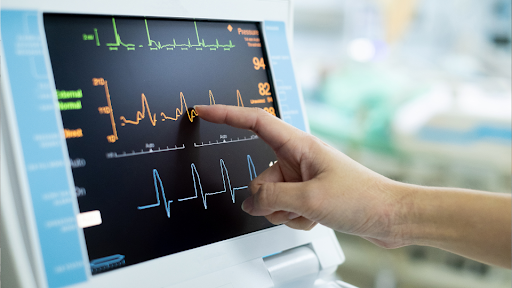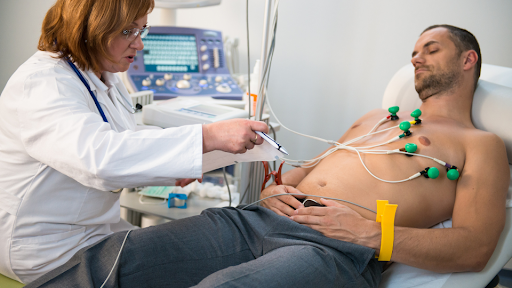When it comes to urgent medical situations, many individuals often find themselves asking what services are available at their local urgent care facilities. One common query is whether urgent care centers perform electrocardiograms (EKGs). Understanding the capabilities of these facilities can help patients make informed decisions about where to seek care.
 What is an EKG?
What is an EKG?
An electrocardiogram, or EKG, is a test that measures the electrical activity of the heart. It provides crucial information about heart rhythm, size, and any potential damage to the heart muscle. This non-invasive test is typically used to diagnose various heart conditions, including arrhythmias, heart attacks, and other cardiac issues.
During an EKG, electrodes are placed on the skin, usually on the chest, arms, and legs. These electrodes detect the electrical impulses generated by the heart and transmit the data to a monitor, where it is recorded and analyzed by healthcare professionals. The results can help guide treatment decisions and determine the next steps in patient care.
In addition to diagnosing existing heart conditions, EKGs can also be used as a preventive measure. For instance, athletes may undergo EKG testing to ensure their hearts are healthy enough to handle the physical demands of their sport. Furthermore, routine EKGs can help identify risk factors for heart disease, allowing for early intervention and lifestyle modifications that can significantly improve long-term health outcomes.
The interpretation of an EKG is a skill that requires extensive training and experience. Healthcare providers look for specific patterns in the EKG waveform, such as the P wave, QRS complex, and T wave, each of which corresponds to different phases of the heart's electrical cycle. Abnormalities in these patterns can indicate various issues, such as ischemia, hypertrophy, or electrolyte imbalances. As technology advances, portable EKG devices are becoming more accessible, enabling patients to monitor their heart health from the comfort of their homes, thus fostering a proactive approach to cardiovascular care.
Urgent Care Facilities: What Services Do They Offer?
Urgent care centers are designed to provide immediate care for non-life-threatening conditions that require prompt attention. They serve as a bridge between primary care physicians and emergency rooms, offering a range of services that can include:
Minor injury treatment (cuts, sprains, fractures)
Infections (cold, flu, urinary tract infections)
Diagnostic tests (X-rays, lab tests)
Vaccinations and preventive care
However, the specific services offered can vary significantly between different urgent care facilities. Some may have the capability to perform EKGs, while others may not. It is essential for patients to check with their local urgent care center to determine if EKGs are available. Many urgent care centers also offer extended hours, making them a convenient option for those who cannot see their primary care physician during regular office hours. This flexibility allows patients to receive care when they need it most, without the long wait times often associated with emergency rooms.
When to Consider an EKG
Patients experiencing symptoms such as chest pain, shortness of breath, or palpitations should seek medical attention promptly. In these situations, an EKG can be a valuable diagnostic tool. If a patient visits an urgent care center with these symptoms, the medical staff will assess the situation and determine whether an EKG is necessary. It's important to note that while urgent care centers can manage many urgent health issues, they are not equipped to handle life-threatening emergencies, such as severe chest pain indicative of a heart attack, which would require immediate emergency room intervention.
In cases where urgent care centers do not perform EKGs, they may refer patients to a nearby hospital or a specialized cardiology clinic for further evaluation. This highlights the importance of understanding the capabilities of your local urgent care facility. Additionally, many urgent care centers are equipped with telemedicine capabilities, allowing them to connect patients with specialists remotely for consultations. This can be especially beneficial for patients needing follow-up care or those who may have difficulty traveling to a specialist's office. Understanding these options can enhance the overall care experience and ensure that patients receive the most appropriate treatment in a timely manner.
 Do Urgent Care Centers Perform EKGs?
Do Urgent Care Centers Perform EKGs?
The answer to whether urgent care centers perform EKGs is not straightforward. While some urgent care facilities are equipped with EKG machines and trained personnel to administer the test, others may not have this capability. It largely depends on the specific center's resources and the regulations in the area.
Patients should not assume that all urgent care centers will provide EKG services. It's advisable to call ahead or check the center's website for information regarding their available diagnostic tests. This can save time and ensure that patients receive the appropriate care they need.
Benefits of EKGs in Urgent Care
Urgent care centers that provide EKG services offer several key advantages. Having on-site EKG capabilities enables faster identification and management of potential heart-related issues—an especially critical benefit in urgent situations where time is of the essence.
Access to immediate EKG results also empowers healthcare providers to make timely, informed decisions. When a serious condition is detected, patients can be promptly referred to a hospital for advanced care, helping to avoid unnecessary delays in treatment.
Moreover, EKGs can also be beneficial for patients experiencing symptoms such as chest pain, shortness of breath, or palpitations. These symptoms can indicate a range of cardiac conditions, and an EKG can provide vital information about the heart's rhythm and electrical activity. By conducting an EKG in an urgent care setting, healthcare providers can quickly assess whether a patient is experiencing a heart attack or other serious issues, allowing for prompt intervention.
In addition to immediate care, the ability to perform EKGs in urgent care centers can also alleviate some of the burdens on emergency departments. By addressing non-life-threatening cardiac concerns in an urgent care setting, patients can receive timely care without overwhelming hospital resources. This not only improves patient outcomes but also enhances the overall efficiency of the healthcare system, ensuring that emergency departments can focus on more critical cases.
Alternatives to Urgent Care for EKGs
If a local urgent care center does not provide EKG services, patients have several alternatives. Hospitals typically have the necessary equipment and staff to perform EKGs and can provide comprehensive cardiac care. However, emergency rooms can be crowded, and wait times may be longer compared to urgent care facilities. In addition to hospitals, many specialized cardiac clinics are available that focus solely on heart health. These clinics often have advanced technology and can offer a more personalized approach to cardiac care, including stress tests and echocardiograms, which can provide a more complete picture of a patient's heart health.
Another option is to consult with a primary care physician or a cardiologist. These healthcare professionals can order EKGs and interpret the results within the context of a patient's overall health. However, this may require scheduling an appointment and could take longer than visiting an urgent care center. Additionally, some primary care offices are now equipped with portable EKG machines, allowing them to perform the test on-site, which can expedite the process for patients who need immediate attention.
Telehealth as a Convenient Option
In today's digital age, telehealth services have become an increasingly popular option for patients seeking medical advice and care. Platforms like Doctronic.ai offer convenient access to healthcare professionals who can provide guidance on whether an EKG is necessary based on symptoms and medical history. This service not only saves time but also allows patients to connect with specialists who may not be available in their local area, broadening their access to expert opinions.
Through telehealth, patients can receive timely consultations without the need to visit a physical location. This can be particularly beneficial for those who may have difficulty accessing urgent care facilities or who prefer to consult with a doctor from the comfort of their home. Furthermore, many telehealth platforms now offer the option to send at-home EKG devices to patients, enabling them to conduct tests in their own environment and share the results with their healthcare provider in real-time. This innovative approach not only enhances patient convenience but also promotes proactive health management, allowing individuals to monitor their heart health more effectively.
Understanding the Limitations of Urgent Care
While urgent care centers are a valuable resource for many medical needs, they do have limitations. Not all urgent care facilities are equipped to handle complex medical conditions, and their primary focus is on non-life-threatening situations. Patients experiencing severe symptoms or those with pre-existing conditions should always consider seeking care from a hospital or specialized clinic.
Moreover, urgent care centers may not have the same level of resources as hospitals, including advanced diagnostic tools and specialists. This can impact the quality of care and the ability to perform certain tests, such as EKGs. For instance, while an urgent care center may be able to treat minor fractures or infections, it might lack the necessary imaging technology to diagnose more serious conditions like a pulmonary embolism or a heart attack, which require immediate and comprehensive evaluation.
Patient Education and Empowerment
Understanding the capabilities of urgent care centers and the importance of EKGs empowers patients to make informed decisions about their healthcare. Knowledge about when to seek immediate care and where to go can significantly impact health outcomes. It is crucial for patients to recognize the signs that warrant a visit to an emergency room rather than an urgent care facility, such as chest pain, difficulty breathing, or severe abdominal pain. These symptoms could indicate life-threatening conditions that require immediate intervention.
Patients should take an active role in their health by asking questions, researching available services, and utilizing resources like telehealth platforms. This proactive approach can lead to better health management and quicker access to necessary care. Additionally, maintaining an updated medical history and a list of current medications can be invaluable during any visit, ensuring that healthcare providers have the information needed to make informed decisions. By being well-prepared and informed, patients can navigate the healthcare system more effectively, ensuring they receive the right care at the right time.
Navigating EKG Needs with Confidence
In summary, whether urgent care centers perform EKGs varies by location and available resources. Patients experiencing symptoms that may require an EKG should check with their local urgent care facility to determine if the service is offered. If not, alternatives such as hospitals or telehealth platforms like Doctronic.ai can provide the necessary support and guidance.
As healthcare continues to evolve, understanding the options available can help patients navigate their medical needs effectively. Whether through urgent care, telehealth, or traditional medical facilities, the goal remains the same: ensuring timely and appropriate care for all patients.
Experience the Future of Healthcare with Doctronic
When you need answers fast and can't afford to wait for an EKG at urgent care, Doctronic is here to help. Our AI-powered doctor provides immediate, personalized medical advice 24/7 in all 50 states. With over 10 million satisfied users, Doctronic offers the most modern, peer-reviewed medical expertise at your fingertips. Whether you're seeking a second opinion or a comprehensive diagnosis, our AI doctor is always available, never rushes, and remembers every detail of your medical history. For a smarter, faster, and more personal healthcare experience, skip the line and talk to an AI Doctor now, for free.



 What is an EKG?
What is an EKG? Do Urgent Care Centers Perform EKGs?
Do Urgent Care Centers Perform EKGs?